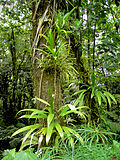Habitat
A habitat is the natural environment in which an organism or a population lives and grows. It is characterized by both physical and biological features. A habitat differs from an ecosystem in that it refers specifically to the geographical areas that support the life of a particular species or group of species, whereas ecosystems refer to the interactions between various organisms and their environments.
Characteristics[edit]
Habitats are characterized by factors such as climate, landscape, geology, and the availability of water. These factors determine the types of flora and fauna that can thrive in that environment. Habitats can range from the vast oceans and rainforests to more specific locales like coral reefs, deserts, and mountain ranges.
Types of Habitats[edit]
There are numerous types of habitats around the world, each supporting different types of life forms. Some of the major types include:
- Aquatic habitats, which include freshwater habitats like lakes, rivers, wetlands, and marine habitats like oceans and seas.
- Terrestrial habitats, which include forests, grasslands, deserts, and tundra.
- Urban habitats, where many species have adapted to living in or around areas heavily modified by humans.
Habitat Conservation[edit]
Habitat conservation is critical for protecting biodiversity. Many habitats are under threat from activities such as deforestation, pollution, urbanization, and climate change. Conservation efforts include establishing protected areas, restoring damaged ecosystems, and implementing sustainable practices to minimize human impact.
Impact of Climate Change[edit]
Climate change poses a significant threat to many habitats. Changes in temperature and weather patterns can alter habitats, making them inhospitable for the species that currently reside in them. This can lead to species migrations and even extinction if organisms cannot adapt quickly enough.
See Also[edit]

This article is a environment-related stub. You can help WikiMD by expanding it!
-
Enderbury Day 1
-
Antarctic
-
Ibex in the French Vanoise National Park
-
Epiphytes in Dominica
-
Marsa Alam
-
Danau Sentarum
-
A leaf beetle peeking from a leaf hole
-
Cryptoendolith
-
Dense mass of anomuran crab Kiwa around deep-sea hydrothermal vent
-
Mt St Helens Johnston Ridge 25 years later
Ad. Transform your life with W8MD's Budget GLP-1 injections from $49.99


W8MD offers a medical weight loss program to lose weight in Philadelphia. Our physician-supervised medical weight loss provides:
- Weight loss injections in NYC (generic and brand names):
- Zepbound / Mounjaro, Wegovy / Ozempic, Saxenda
- Most insurances accepted or discounted self-pay rates. We will obtain insurance prior authorizations if needed.
- Generic GLP1 weight loss injections from $49.99 for the starting dose of Semaglutide and $65.00 for Tirzepatide.
- Also offer prescription weight loss medications including Phentermine, Qsymia, Diethylpropion, Contrave etc.
NYC weight loss doctor appointmentsNYC weight loss doctor appointments
Start your NYC weight loss journey today at our NYC medical weight loss and Philadelphia medical weight loss clinics.
- Call 718-946-5500 to lose weight in NYC or for medical weight loss in Philadelphia 215-676-2334.
- Tags:NYC medical weight loss, Philadelphia lose weight Zepbound NYC, Budget GLP1 weight loss injections, Wegovy Philadelphia, Wegovy NYC, Philadelphia medical weight loss, Brookly weight loss and Wegovy NYC
|
WikiMD's Wellness Encyclopedia |
| Let Food Be Thy Medicine Medicine Thy Food - Hippocrates |
Medical Disclaimer: WikiMD is not a substitute for professional medical advice. The information on WikiMD is provided as an information resource only, may be incorrect, outdated or misleading, and is not to be used or relied on for any diagnostic or treatment purposes. Please consult your health care provider before making any healthcare decisions or for guidance about a specific medical condition. WikiMD expressly disclaims responsibility, and shall have no liability, for any damages, loss, injury, or liability whatsoever suffered as a result of your reliance on the information contained in this site. By visiting this site you agree to the foregoing terms and conditions, which may from time to time be changed or supplemented by WikiMD. If you do not agree to the foregoing terms and conditions, you should not enter or use this site. See full disclaimer.
Credits:Most images are courtesy of Wikimedia commons, and templates, categories Wikipedia, licensed under CC BY SA or similar.
Translate this page: - East Asian
中文,
日本,
한국어,
South Asian
हिन्दी,
தமிழ்,
తెలుగు,
Urdu,
ಕನ್ನಡ,
Southeast Asian
Indonesian,
Vietnamese,
Thai,
မြန်မာဘာသာ,
বাংলা
European
español,
Deutsch,
français,
Greek,
português do Brasil,
polski,
română,
русский,
Nederlands,
norsk,
svenska,
suomi,
Italian
Middle Eastern & African
عربى,
Turkish,
Persian,
Hebrew,
Afrikaans,
isiZulu,
Kiswahili,
Other
Bulgarian,
Hungarian,
Czech,
Swedish,
മലയാളം,
मराठी,
ਪੰਜਾਬੀ,
ગુજરાતી,
Portuguese,
Ukrainian








